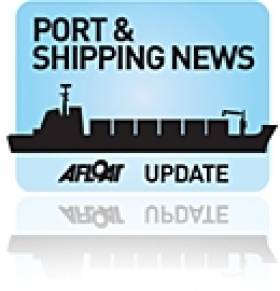Displaying items by tag: Hibernia Seaways
Stena Route To Close This Week
The Stena Leader went to lay-up in Belfast. In the meantime the remaining vessels Stena Seafarer and Stena Pioneer continue to serve the Northern Ireland-Lancashire link.When the route closes, it is expected that the pair will re-join the Stena Leader in Belfast, where all three sisters will be at lay-up berth at Albert Quay. The Swedish owned ferry operator uses the port's Victoria Terminal 4, for their HSS and conventional ferry service to Stranrear, Scotland.
In early December Stena Line announced the acquisition of two routes and four vessels from rivals, DFDS Seaways. The £40m deal sees Stena taking over the freight-only route between Belfast and Heysham operated by Scotia Seaways and Hibernia Seaways, a pair of Japanese built 13,000 gross tonnes vessels.
The second route is the Belfast-Birkenhead (Liverpool) route, served by two chartered 27,000 gross tonnes ro-pax sisters, Lagan Seaways and Mersey Seaways. The ro-pax vessels will be sold to Stena Line as part of the agreement between the two ferry operators.
Irish Sea Newcomer Sells Routes To Stena
The sale covers the routes between Belfast and Birkenhead (Liverpool) and Belfast-Heysham. Operating on the northern Irish Sea routes are two 13,000 gross tonnes Japanese built freight ro-ro ferries sisters Hibernia Seaways and Scotia Seaways in addition to two chartered ro-pax vessels as part of the transaction.
Niels Smedegaard, CEO of DFDS, said: "The Irish routes we took over in conjunction with the purchase of Norfolkline have, in spite of the recent impressive efforts by everyone employed on the routes, in the last two years lost more than thirty million euros. Given the depressed economies a turnaround of the activities, without structural solutions, is not realistic. On this basis, we have decided to scale back our activities and sell the two routes to and from Belfast."
In the deal Stena Line, the Swedish owner will also take control of port terminals in Belfast, Birkenhead and Heysham. The majority of shore-based staff at these port terminals will be transferred to Stena, maintaining their current conditions.
DFDS and Stena Line will share staff at these locations during an agreed transitional period at the end of which DFDS will establish their own agency operations at Birkenhead and Heysham.
The new arrangement will see DFDS focusing on its other services between Dublin to Birkenhead (which includes passengers) and from Dublin to Heysham. Italian built sisters ro-pax sisters Liverpool Seaways and Dublin Seaways currently operate on the Dublin-Birkenhead route and the 120-trailer freight-ferry, Anglia Seaways maintains serving the Heysham route. Operations at the Dublin Port terminal are not affected by this transaction.
DFDS will continue to review their strategic and operations routes in Dublin, which is expected to be completed in the first quarter of 2011. The Danish owned shipping and logistics transportation company operate an extensive route network throughout the Irish Sea, North Sea and Scandinavia.





























































